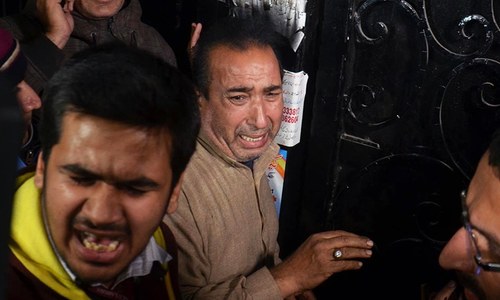LAHORE: Punjab has requested the federal government to deploy over 2,000 Rangers personnel in the province whom it will allow police powers to conduct intelligence-based operations (IBOs) against terrorists, wherever required, with full authority.
The province had been resisting such powers of police officers for Rangers whenever the issue of their deployment to fight terrorists here came up in the past. Officials say the force is now being called in and given such powers specifically for IBOs.
The decision to call in Rangers to fight terrorists was taken at a meeting of the provincial apex committee which was presided over by Chief Minister Shahbaz Sharif and attended among others by National Security Adviser retired Lt Gen Nasser Khan Janjua, Lahore Corps Commander Lt Gen Sadiq Ali and Punjab Rangers Director General Maj Gen Azhar Naveed Hayat on Sunday.
The meeting was held in the aftermath of a suicide attack at Charing Cross on The Mall on Feb 13, claiming the lives of 14 people, including Deputy Inspector General Capt Mubin and Senior Superintendent of Police Zahid Nawaz Gondal.
“We have requested the federal interior division to deploy around 2,000 Rangers who will be assisted by their support staff to conduct operations against terrorists in Punjab initially for 60 to 90 days,” a senior provincial government official told Dawn on Tuesday.
Personnel to conduct operations initially for 60 to 90 days
He said Rangers would conduct IBOs in league with the Counter-Terrorism Department (CTD) all over the province. Regular police would be asked for support only if required, the official said.
Rangers were being given powers of police officers under Section 5 of the Anti-Terrorism Act (ATA). All cases of terrorism would be registered at CTD police stations. Rangers would also have cases registered like CTD officers are authorised to under the law with legal cover for all other actions during and after operations.
Section 5(1) of the ATA states that any police officer, or member of the armed forces, or civil armed forces (Rangers) who is present or deployed in any area may, after giving sufficient warning, use the necessary force to prevent the commission of terrorist acts or scheduled offences. In doing so he, in the case of an officer of the armed forces or civil armed forces, shall exercise all the powers of a police officer under the Code (Criminal Procedure Code 1898)”.
Section 5(2) of the law says that in particular and without prejudice to generality of the provisions of subsection, an officer of the police, armed forces and civil armed forces may, after giving prior warning use such force as may be deemed necessary or appropriate bearing in mind all the facts and circumstances of the situation, against any person who is committing a terrorist act or a scheduled offence.
It shall be lawful for any such officer or any superior officer to fire or order the firing upon any person or persons against whom he is authorised to use force. This they will do while arresting without warrant any person who has committed an act of terrorism or a scheduled offence or is suspected of any such act.
The officer also has powers for entering and searching, without warrant, any premises to make any arrest or to take possession of any property, firearm, weapon or article used, or likely to be used, for any offence of terrorism.
Published in Dawn, February 22nd, 2017














































